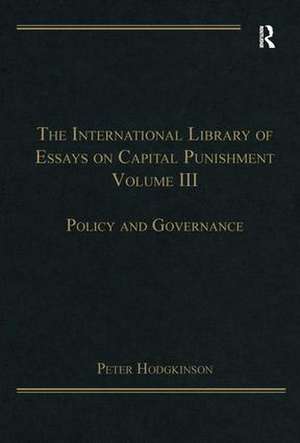The International Library of Essays on Capital Punishment, Volume 3: Policy and Governance: The International Library of Essays on Capital Punishment
Autor Peter Hodgkinsonen Limba Engleză Hardback – 19 dec 2013
Preț: 1366.14 lei
Preț vechi: 1828.90 lei
-25% Nou
Puncte Express: 2049
Preț estimativ în valută:
261.53€ • 268.97$ • 216.97£
261.53€ • 268.97$ • 216.97£
Carte tipărită la comandă
Livrare economică 15 februarie-01 martie
Preluare comenzi: 021 569.72.76
Specificații
ISBN-13: 9781409461371
ISBN-10: 1409461378
Pagini: 680
Dimensiuni: 169 x 244 mm
Greutate: 1.42 kg
Ediția:New.
Editura: Taylor & Francis
Colecția Routledge
Seria The International Library of Essays on Capital Punishment
Locul publicării:Oxford, United Kingdom
ISBN-10: 1409461378
Pagini: 680
Dimensiuni: 169 x 244 mm
Greutate: 1.42 kg
Ediția:New.
Editura: Taylor & Francis
Colecția Routledge
Seria The International Library of Essays on Capital Punishment
Locul publicării:Oxford, United Kingdom
Cuprins
Contents: Introduction; Part I Medical Issues: Doctors and the death penalty: ethics and a cruel punishment, Robert Ferris and James Welsh; Capital punishment and mental health issues: global examples, Nicola Browne, Seema Kandelia, Rupa Reddy and Peter Hodgkinson; The use of prisoners as sources of organs - an ethically dubious practice, Arthur Caplan; The Royal College of Psychiatrists and the death penalty, John Gunn; Physicians must honor refusal of treatment to restore competency by non-dangerous inmates on death row, Howard Zonana; Physicians should treat mentally ill death row inmates, even if treatment is refused, Melissa McDonnell and Robert T.M. Phillips; Organs by firing squad: the medical and moral implausibility of death penalty organ procurement, Daniel Fu-Chang Tsai, Meng-Kung Tsai and Wen-Je Ko. Part II Capital Punishment Policy Around the World: The abolition of the death penalty in Taiwan: why a de facto moratorium was established and lost, Fort Fu-Te Liao; Executions, imprisonment and crime in Trinidad and Tobago, David F. Greenberg and Biko Agozino; Between elite compliance and state socialisation: the abolition of the death penalty in Eastern Europe, Ridvan Peshkopia and Arben Imami; The abolition of the death penalty in Rwanda, Audrey Boctor; Death penalty politics and symbolic law in Russia, Olga B. Semukhina and John F. Galliher; The death penalty in China today: kill fewer, kill cautiously, Susan Trevaskes; Japan - the government’s support for capital punishment between 2009 and 2012, Mika Obara; Capital punishment in New Zealand: resurrection and repeal, Greg Newbold. Part III Executions, Executioners and the Condemned: Apology and remorse in the last statements of death row prisoners, Judy Eaton and Anna Theuer; Current issues involving lethal injection, Andrew Fulkerson and Michael Suttmoeller; The role of moral disengagement in the execution process, Michael J. Osofsky, Albert Bandura and Philip G. Zimbardo; The psychological experience of security officers who work with executions, Michael J. Osofsky and Howard J. Osofsky; Public penology: postcolonial biopolitics and a death in Alipur central jail, Calcutta, Baidik Bhattacharya; The executioner: his place in English society, Gerald D. Robin; State executioner Pierrepoint: a cinematic portrayal of moral disengagement, Steve Greenfield. Part IV Media: The media and the death penalty: the limits of sentimentality, the power of abjection, Roseanne Kennedy; Televising executions, primetime ‘live’?, Paul S. Leighton; Fear factor: the role of the media in covering and shaping the death penalty, Susan Bandes; Law-and-order politics, public-opinion polls and the media, Sharon Casey and Philip Mohr. Part V Capital Punishment and Religion: Capital punishment in the Islamic jurisprudence, Ahmed Abbadi; God and the executioner: the influence of Western religion on the death penalty, Davison M. Douglas; Of compassion and capital punishment: a Buddhist perspective on the death penalty, Damien P. Horrigan; Death as a penalty in the Shari’a, M. Cherif Bassouni. Part VI Drug Offenders and Capital Punishment: The death penalty for drug offences: shared responsibility and shared consequences, Patrick Gallahue and Rick Lines. Part VII War and the Death Penalty: ‘Shot at dawn’: military executions in the Great War, Cathryn Corns; The death penalty and war, Bertil Dunér and Hanna Geurtsen; Executing US soldiers in England, World War II, command influence and sexual racism, J. Robert Lilley and Michael Thomson; Name index.
Notă biografică
Peter Hodgkinson OBE is Director of the Centre for Capital Punishment Studies and Senior Research Fellow at the University of Westminster, UK.
Descriere
This volume provides analyses of a range of subjects and issues in the death penalty debate, from medicine to the media. The essays address in particular the personal complexities of those involved, a fundamental part of the subject usually overridden by the theoretical and legal aspects of the debate. Additionally, the international range of the analysis, enabling disaggregation of country specific motivations, ensures the complexities of the death penalty are also considered from a global perspective.


